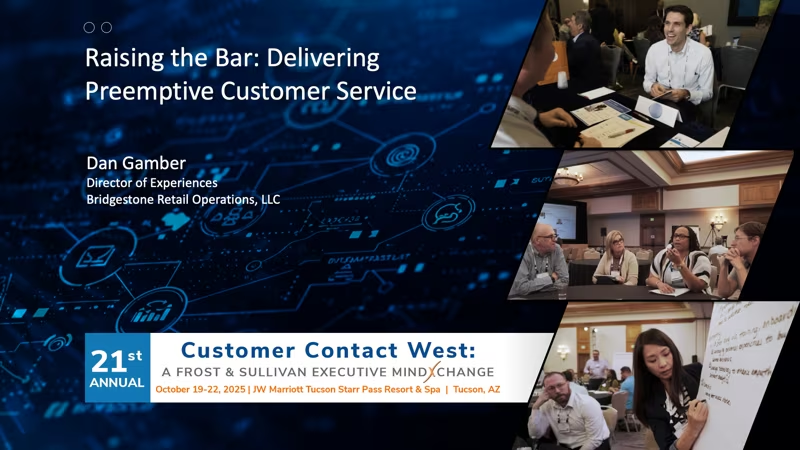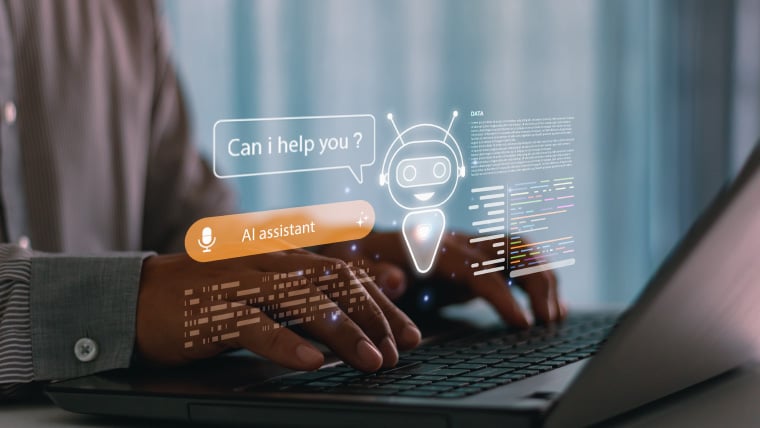Futurist speaker and university instructor Christina “CK” Kerley recently led a session entitled “Shock, Awe and AI” at Customer Contact West: A Frost & Sullivan Executive MindXchange in Huntington Beach, California.
CK, who has guided many Fortune 500 companies and trained thousands of executives through years of digital disruptions, emphasized that the headlines, hashtags and Hollywood movies about AI can be all gloom and doom, and often get the story wrong. Most of the depictions are not the truth . . . or at least not the full story.
Aiming to clarify many of these misconceptions, she discussed the 10 biggest myths about AI, and worked to set the record straight by outlining the many ways that AI will indeed change, and improve, our lives:
The 10 Biggest Myths about AI: Setting the Record Straight
Myth #1: AI will compete with humans. This is incorrect – AI collaborates with humans, it’s a complementary relationship. AI can help elevate and assist us. AI tutoring can help accelerate your child’s learning. AI will brainstorm story development with writers. AI can prevent disease from taking hold. And can prevent wildfires from getting out of control.
Myth #2: AI will automate jobs. Again, this is incorrect. AI will elevate jobs. It will assist and amplify professionals so that they can make the most of their time. And it will assist humans through a variety of helpful “roles”: be it a creative companion, a customer-interaction sidekick, a data whiz, or even an innovation guru.
Myth #3: AI will take all our jobs. The real AI job story is not about job replacement, it’s about reskilling. In spite of what the headlines say, AI is not taking our jobs – but we urgently need to reskill. Reskilling our workforces to meet this historic moment is a strategic imperative, and companies will need to build cultures of continuous learning. It is estimated that 40-50% of employees will require reskilling over the next 3 years—a number that could swell to reskilling 90% of employees globally by 2030.
Myth #4: The rise of robots will dehumanize – no, it will re-humanize us. While everyone is focused on “the Rise of the Robots,” the real story is that AI will herald a Human Renaissance. Human-centric soft skills, like creative thinking, collaboration, and emotional intelligence, are back in demand since AI will help with many digital tasks. Furthermore, better human-to-machine relationships will result in better human-to-human experiences. And with the mounting talent shortage that could result in an 85 million unfilled jobs globally by 2030, billions of humans will become very precious in a time of trillions of AIs.
Myth #5: In an AI world the most valuable skill is having the right answers. Again, this is incorrect. It’s about asking the right questions. At its core, critical thinking is a process of questioning. Consider redefining smart: the smartest person in the room isn’t the one with all the answers—as we’ll have AIs for answers. Conversely, the most valuable professionals will be those that are asking the right questions. As CK explained, all advancements, discoveries, and innovations began not with answers . . . but with questions (like asking “Why?” and “Why Not?”)
Myth #6: is that 21st century winners will have the best budgets and SEO. Rather, in the “AI: Age of Ideas,”generative AI will democratize the process of creation by making it affordable and scalable… and ergo, the best IDEAS will win.
Myth #7: suggests that to win, businesses must focus on AI. But here’s the rub, they actually need to focus on humans. After all, humans are shaped by these tools, not the other way around. We need to ask how technology changes human expectations, preferences, and behaviors. Without question, human expectations will skyrocket with AI, even more so than they did in the mobile era.
Myth #8: details how AI success requires new strategies. But the truth is that AI primarily requires new business models. After all, AI is a transformative technology—and thus, the core business model must transform if businesses want to remain viable, and vibrant. Examples that reinforce the need for new models will be evident in scores of industries. In health care, we will shift from delivering ‘sick care’ to practicing ‘preventive health care.’ In education, we will transition from one-size-fits-all generalized lectures to personalized learning, customized to each student’s strengths and weaknesses. Even our agricultural systems will move from wasteful, harmful pesticides to precision agriculture that will use 90% less of these harmful chemicals.
Myth #9: the current thinking is that we will focus on AI. But the reality is that AI will focus on us. And AI will serve us in myriad ways: from digitizing the physical world’s objects and places, to turning our point-and-click systems into conversational-and-gestural interfaces; to migrating us from dull 2D computing screens into vibrant 3D holographic displays. Moreover, AI will turn our Web from a static database into a dynamic, personalized experience.
Myth #10: the best thing we’ll get from AI is tools. The real answer is that the most beneficial thing that AI will give back to us is our time. AIs will give us more time to work on the projects and passions that we value most. Moreover, it will give us more time to spend with the people that are most meaningful to us—both in our professional teams, and with our personal loved ones.
All of these realities (not myths!) can be achieved because our world will be revolutionized, rehumanized, amplified, and assisted by AI.
As stated, a key factor to successfully moving forward with AI is the priority of reskilling our workforces, and ourselves. Humans are not being replaced by AIs, but professionals without AI skills will replace those without these capabilities. Moreover, as AIs keep getting smarter, professionals will need to keep getting wiser. To that end, companies must build cultures of continuous learning that facilitate constantly refreshing our skills. Ultimately, technology is a tool, the strategy is reinvention, and the goal is (always!) relevance.
Powerhouse keynoter, Rutgers Business School Instructor, and Corporate Trainer Christina “CK” Kerley has guided scores of Fortune 500s—and thousands of executives—through 25 years of digital disruptions, revolutions, and reinventions. She’s currently focused on: AI, The Tech Megatrends, and The Reskilling Revolution. More info at: https://allthingsCK.com



